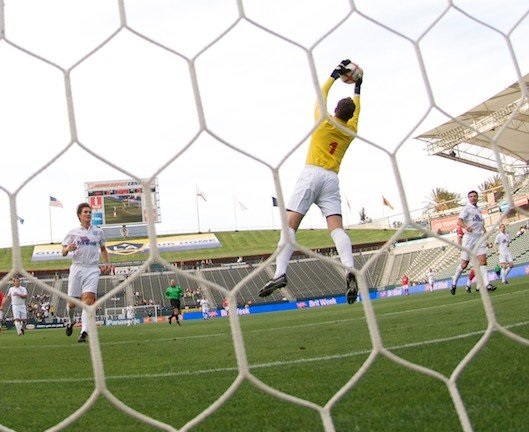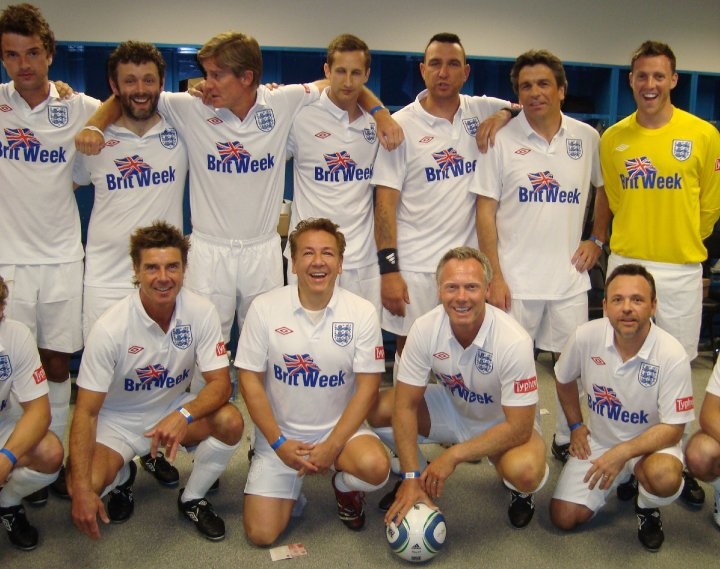SoccerToday Spotlight Series: Youth Soccer Coaches
Originally from England, Louis Hunt moved to California in 2006 after graduating from the University of Wolverhampton in the UK, attaining a BA Hons Degree in Sport Studies. During his time in California, Hunt has completed all of the U.S. Soccer coaching courses, and received his USSF A license in January 2015. He also holds a USSF National Goalkeeper License.
Prior to his professional coaching career, Hunt was a successful player from an early age. He played for his home town club in the Bishops Stortford Youth Academy as well as trials at Leyton Orient FC before playing semi-professional at the age of 15. He went on to be an all first team starting Goalkeeper for three years for the University of Wolverhampton men’s soccer team.
In addition to coaching youth soccer, Hunt has over seven years of experience coaching girls high school soccer. More impressively, he was also on staff for four seasons at the NCAA Division II level with Cal Poly Pomona working as and assistant coach and goalkeeper coach. Hunt also worked for U.S. Soccer in their Los Angeles Training Centers.
Hunt joined San Diego’s Surf SC in April 2016, after 10 years with LA Premier FC, most recently as the Director of Coaching.
 Check out SoccerToday’s interview with San Diego Surf SC’s new addition Louis Hunt.
Check out SoccerToday’s interview with San Diego Surf SC’s new addition Louis Hunt.
Diane Scavuzzo: Where did you train as a youth player?
Louis Hunt: I started playing soccer when I was about 7 years old after my dad took me to an Aston Villa game for the first time. I played for my towns local semi-professional club as a youth player from ages U9-U13 before playing mens soccer for the first time when I was 15 as a goalkeeper.
Diane Scavuzzo: When did you start coaching youth soccer?
Louis Hunt: I actually started coaching when I was 15 years old, helping out my younger brother’s youth team — assisting their head coach who ran his own soccer schools. This led to me to running ‘after school community’ sessions and being a skills coach for the town’s youth club. While I was at University in England, I would come out to California to run soccer camps in the summer months before I moved out there full time in 2006 to work for LA Premier FC (then LAFC) and UK International Soccer Camps.

Diane Scavuzzo: What is your philosophy on coaching youth soccer?
Louis Hunt: While this ultimately depends on the age and environment as the philosophy a coach has with U8-U10s is different than with a U16-19 age group, or coaching in a college environment, my philosophy for all ages is help the players become comfortable and confident on the ball with an improved knowledge of the game in an environment that is enjoyable.
I know that sounds very basic and generic, but sometimes I feel coaches get away from the enjoyment factor of the sport.
Ultimately we all coach, play and work in soccer because we fell in love with the game.
Especially for kids, this is — or should be — the core reason they are involved in soccer and it’s our responsibility as coaches to provide that environment on a regular basis.
Diane Scavuzzo: What makes a youth soccer coach successful?
Louis Hunt: If a youth player continues to WANT to play soccer and stay in the game it shows their previous coaches have done a good job at making the game enjoyable.
We see many kids leave the sport either at the youth level or at some stage in their college career because they find themselves in the wrong environment and lose the desire and passion to play. If a coach can evaluate what the best environment is to help a player develop and make that level fun, the player will always want to continue in the game and have that desire to push themselves to get better.
Diane Scavuzzo: What is your role at Surf SC?
Louis Hunt: I’ll be coaching the 2000 and 2001 ECNL teams for the 2016/17 season, as well as taking up a role as an Assistant Director of Coaching.

Diane Scavuzzo: What do you think U.S. Soccer needs to do to help soccer be more successful in the USA?
Louis Hunt: I’ve seen the sport grow immensely in the last ten years. I think that’s credit to the work and resources U.S. Soccer has put into growing the game in this country.
At the youth level, U.S. Soccer seems to be consistently evolving and growing, coming up with new and creative ways to improve the youth in our country. The current training center model is excellent.
One thing I believe U.S. Soccer can do is provide more help for the everyday coaches and clubs.
Particularly in Southern California, where we have so many clubs that compete in tournaments, leagues, cups, etc — more could be done to educate clubs, coaches and parents on a grander scale for all those that can’t or don’t have time to take the course. The online resources are getting better, but it would be great if more information/education was given out and implemented into the clubs.
Diane Scavuzzo: What makes a player successful? His or her technical, tactical, soccer IQ, coach-ability, work rate, athleticism, mental toughness, etc.?
Louis Hunt: It really is all those things rapped into one. Most players that go on to play at the highest youth level, make a National Youth/Senior Team and play at a high level in College or even make it professionally, will tick all these boxes. Players really can’t allow for any of the above traits to drop off.
Diane Scavuzzo: As a soccer coach, what do you consider to be your most difficult accomplishment? What was your biggest failure?
Louis Hunt: I think learning how to be flexible as a coach when dealing with all of the different personalities of players is something that takes time and experience. It’s something I try to constantly work and improve on with the more and more players I coach. When you have a roster of 20 players, they all have different needs.
As a coach you have to be able to adapt in many different ways to how players may react to your style and coaching points and how they react to success, failure, competition and tasks.
I’m sure I speak for all coaches when I say at some point there were players in the past that perhaps I didn’t do a great job at with this. Learning and reading a player’s individual personality both on and off the field is crucial. If as a coach/leader you can achieve this, I believe it is a key to success in helping players.
Diane Scavuzzo: Who is or was your greatest role model or mentor, either personally or as a coach?
Louis Hunt: I’ve been fortunate to work with some top coaches over my time in California and the UK. A coach called Tim Moylette in England gave me my first job as a coach when I was 15 years old and he introduced me to the world of soccer coaching which led me to eventually moving out here. For that I will forever be grateful to him.
I learned a lot as Manny Martin’s assistant director at LA Premier FC and at the U.S. Soccer training centers with Tracey Kevins. Tracey has a wealth of experience coaching and directing. Picking her brains was an invaluable learning experience for me. Working and going through the U.S. license system with Jamie Harvey, has been a tremendous experience for improving and developing my coaching as he is also a top coach with a great understanding of the game.

Diane Scavuzzo: If you could pick any superpower, what would it be and why?
Louis Hunt: The ability to read minds. Especially working with teens and young adults.
Understanding an individual’s needs can be the key to getting through to them and figuring out the best way they respond to a coach. You often don’t know what is going on off the field with players and how their family, school, and social life may be affecting them when they step onto the soccer field.
Knowing exactly what to say and when to say it and how to connect with each individual player to get the absolute best out of them can often be the difference between success and failure.
Having the ability to read their minds when they are perhaps a little more shut off, distant or quiet would be a great aid to further assist and help them.
Diane Scavuzzo: Who is your favorite soccer team? Who do you root for behind closed doors?
Louis Hunt: I’m certainly not a “behind closed doors” fan. Although this season it has certainly been painful for me to support Aston Villa. Since I was 7 years old I was hooked with the stadium, the atmosphere, the colors, the energy of the match day experience and the adrenaline rush of when they scored a goal. I’ve been a die-hard fan ever since. Unfortunately there haven’t been many goals to cheer for this season and they are bottom of the EPL and will go down a division for next season. But through blind faith I’m sure they will bounce back quickly — I hope.
Diane Scavuzzo: What inspires you?
Louis Hunt: I think the joy and excitement of progression and development within the game is something that is very satisfying for a coach. When you work hard on the practice fields during the weeks and you see the players executing with success on match day, that is really inspiring to see. When it leads to an individual having a good game, keeping a shut out, making great plays, scoring goals and seeing the hard work pay off with end results and the feeling of accomplishment, its something that is really exciting. Knowing that as a team — players and coaches — you’ve worked hard, left no stone unturned and have ultimately achieved success at the end of it all is just extremely satisfying and an inspiring feeling that you want to recreate time and again.






